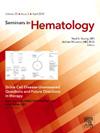原发性和继发性中枢神经系统淋巴瘤的循证管理
IF 5
3区 医学
Q1 HEMATOLOGY
引用次数: 0
摘要
传统上,中枢神经系统(CNS)淋巴瘤的预后非常差,然而,管理的进步导致了患者的显着改善和长期生存。我们描述了这些侵略性疾病的治疗策略的证据。在原发性中枢神经系统淋巴瘤(PCNSL)中,有随机试验数据为治疗决策提供信息,但缺乏这些数据来指导继发性中枢神经系统淋巴瘤(SCNSL)的治疗。在疾病的每个阶段,患者健康和虚弱程度的动态评估是整个治疗过程的关键,同时提供cns生物有效治疗和参加临床试验。对于适合的患者,建议采用高剂量甲氨蝶呤诱导,然后采用基于硫替帕的自体干细胞移植巩固。低强度的化学免疫治疗,新型药物(包括布鲁顿酪氨酸激酶抑制剂,小脑靶向免疫调节剂和临床试验背景下的检查点抑制剂)和全脑放疗可能保留给不太适合的患者或化疗耐药的疾病。关于CAR-T疗法疗效的数据正在出现,但对更大毒性的担忧尚未实现。前瞻性研究的未来领域包括识别发生中枢神经系统淋巴瘤的高风险人群,老年或体弱患者的管理,以及将新药物纳入治疗方案,特别是对那些具有化疗耐药疾病的患者。本文章由计算机程序翻译,如有差异,请以英文原文为准。
Evidence-based management of primary and secondary CNS lymphoma
Central nervous system (CNS) lymphoma has traditionally had very poor outcomes however advances in management have resulted in dramatic improvements and long-term survival of patients. We describe the evidence for treatment strategies for these aggressive disorders. In primary CNS lymphoma there are randomized trial data to inform treatment decisions but these are lacking to guide management in secondary CNS lymphoma. Dynamic assessment of patient fitness and frailty is key throughout treatment, alongside delivery of CNS-bioavailable therapy and enrolment in clinical trials, at each stage of the disease. Intensive high-dose methotrexate-containing induction followed by consolidation with autologous stem cell transplantation with thiotepa-based conditioning is recommended for patients who are fit. Less intensive chemoimmunotherapy, novel agents (including Bruton tyrosine kinase inhibitors, cereblon targeting immunomodulatory agents, and checkpoint inhibitors in the context of clinical trials), and whole brain radiotherapy may be reserved for less fit patients or disease which is chemoresistant. Data regarding the efficacy of chimeric antigen receptor T-cells therapy is emerging, and concerns regarding greater toxicity have not been realized. Future areas of prospective studies include the identification of those at high risk of developing CNS lymphoma, management in elderly or frail patients as well as incorporating novel agents into regimens, particularly for those with chemoresistant disease.
求助全文
通过发布文献求助,成功后即可免费获取论文全文。
去求助
来源期刊

Seminars in hematology
医学-血液学
CiteScore
6.20
自引率
2.80%
发文量
30
审稿时长
35 days
期刊介绍:
Seminars in Hematology aims to present subjects of current importance in clinical hematology, including related areas of oncology, hematopathology, and blood banking. The journal''s unique issue structure allows for a multi-faceted overview of a single topic via a curated selection of review articles, while also offering a variety of articles that present dynamic and front-line material immediately influencing the field. Seminars in Hematology is devoted to making the important and current work accessible, comprehensible, and valuable to the practicing physician, young investigator, clinical practitioners, and internists/paediatricians with strong interests in blood diseases. Seminars in Hematology publishes original research, reviews, short communications and mini- reviews.
 求助内容:
求助内容: 应助结果提醒方式:
应助结果提醒方式:


